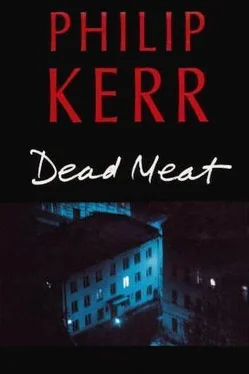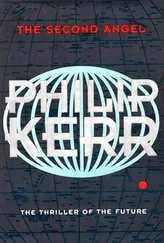‘Hm, so you want some bread?’ Ivan Ivanovich will ask.
‘What’s wrong with that, sir? I could eat a horse!’
‘Hm. I suppose you want some meat as well?’
‘I’ll be pleased with anything you’re kind enough to give me.’
‘Hm, so meat’s better than bread, is it?’
‘You just can’t be fussy when you’re hungry. Anything’s welcome.’
from ‘How Ivan Ivanovich Quarrelled with Ivan Nikiforovich’
— Nikolai Gogol
This novel would not have been possible without the help of St Petersburg’s Central Board of Internal Affairs. In particular, there were three senior policemen, General Arkady Kramarev, Colonel Nikolai Gorbachevski and Lieutenant-Colonel Eugene Ygetin who ensured that almost every door was open to me. I was given a police pass, which enabled me to go in and out of the Big House (as they called their headquarters) as I pleased. A police car with a driver and telephone were made available to me on a twenty-four-hour basis and this meant that I was able to take part in several police operations against the Mafia. At the same time several detectives and investigators took the trouble to describe to me many real cases with which they had been involved, as well as inviting me to their homes and extending to me a hospitality that I often found hard to let myself accept. In short, I was presented with a unique opportunity to observe the men of Russia’s anti-Mafia squad and their methods at considerable length.
As well as the men of the Central Investigating Board, thanks are also due in Russia to Nina Petrovna, Stella Starkova and, for her unfailing patience and honesty, Elena Khristotonova. Thanks are due in London to Nicky Lund, Mark Forstater, Nick Marston, Caradoc King, Alison Lumb, Peter Cregeen, Jonathan Powell and Jonathan Burnham.
September 1992
A Russian can never resist stories, even the ones he tells to himself.
Lone travellers on the night sleeper from St Petersburg will be well aware of the hazards of sharing a two-berth compartment with a stranger. The Red Express is often filled several weeks in advance and the railway booking office takes little account of the sexes of those whom fate has decided to throw together for eight hours or more. My own travelling companion, a handsome-looking woman with beautiful, muscular legs, must have thought me a very dull fellow. During the first part of our journey her efforts to engineer a conversation were almost unflagging, and in this respect she seemed to have more gambits than Gary Kasparov: spiralling inflation, ethnic conflict, increased crime, the Kuril Islands, the price of bread, even — I think this is right — some nonsense about how placentas from Russian abortions were used to make expensive face creams for Western women. She tried everything to get me to talk short of using a cosh and a bright light.
Most men would have given their thumbs for such an attractive and well connected travelling companion as I had, especially one so obviously keen to talk. Good-looking women are usually cold and distant when you are lucky enough to meet them alone on a train in a two-berth compartment. But my replies were monosyllabic to say the least. Not that I am usually the uncommunicative type; however on this occasion my mind was elsewhere. Sometimes it was racing through the mid-summer’s air and over the flat countryside that lay spread like a vast counterpane outside the window of our carriage. But mostly it was back in St Petersburg with Yevgeni Ivanovich Grushko and the men of the Central Board.
Chekhov says that a storyteller should show life neither as it is nor as it ought to be, but as we see it in our dreams. Dozing in my warm berth that was indeed how it all seemed to me now, for in a sense my story had started on this very train when, several weeks before, I had travelled in the opposite direction, on a temporary attachment to St Petersburg’s Central Investigating Board at the orders of my superiors in Moscow. It was hoped that I might improve my knowledge of how the Mafia worked.
Not that Moscow’s underworld is any less in evidence these days. Far from it. No, it was just that the St Petersburg Central Board, and in particular its most senior detective, Yevgeni Ivanovich Grushko, seemed better able to deal with the Mafia than we were in Moscow. The figures would speak for themselves if I had them to hand. Every man has his own special subject. The shepherd knows more about sheep than the most dedicated of scholars. Grushko knew more about the Mafia than any other policeman in the new Commonwealth of Independent States. But there is a saying that ought to have warned me to be careful of him: beware of a man of one book.
Not that there was much that would have made you immediately wary of him. His face, like his manner, was open and friendly. He wasn’t particularly tall, although he looked fit enough. He wore his grey hair long on top of his head, like the young Elvis Presley, and, when I had known him long enough to become aware of his habits and saw that he combed it very often, I recognised that this was his only personal vanity. Nor was Grushko an unlettered man, as I discovered within a few minutes of shaking his sandpaper-hard hand that first morning we met, on the platform at Petersburg’s Moscow Station.
‘Did you have a good journey?’ he asked, picking my bags off the station platform.
I explained how I had been obliged to share the compartment with an extremely smelly babushka who had snored like a saw for almost the entire journey.
‘Have you been in St Petersburg before?’
‘Not since I was a schoolboy.’
That seemed so long ago, in those early Sputnik-Gagarin days, when it seemed that the Soviet Union was the most impregnable nation on earth. For a moment I was transported back to the same railway-station platform; I was holding my mother’s hand and listening to her explain how we would see the most fabulous palaces in the world, while my father unloaded our bags from the carriage. I did not hear much of what Grushko said for at least a minute or two. When I came out of my reverie he was quoting what Dostoevsky had said about St Petersburg.
‘“This is the most abstract and intentional city in the whole world,”’ he said, without a hint of self-consciousness and led me out of the station on to Nevsky Prospekt, where he had parked his Zhiguli.
I said that I had always wondered what Dostoevsky had meant by that particular remark about Leningrad.
‘St Petersburg — it’s an ideal,’ he explained. ‘The product of one man’s will. By the way, never ever call it Leningrad, except in retrospect. That’s all finished now.’
I looked along the length of the broad thoroughfare. It was a warm June day and things could not have looked less abstract. There is an impressive solidity about St Petersburg.
‘Of course, you wouldn’t think it now,’ he said taking a deep, euphoric breath of the early morning air, ‘but this really is a very stupid place for anyone to have built a city. Ice-bound for half the year, although there are some people who say our northern frost is very good for the health. Little more than a swamp when Peter the Great first came. All the stone had to be brought in specially. Thousands of the poor serfs died. That’s why they say St Petersburg is built on bones.’
He opened the boot of the Zhiguli and then squashed my luggage underneath the lid as if he had been crushing the body of one of those poor serfs.
‘Perhaps that’s why there’s so much crime here in Peter,’ he said, offering me a cigarette. ‘All that blood.’
Читать дальше












